Fried food twice per week limit in school meals
- Published
- comments
Parents and children tell the BBC what they think of the new rules
School meals in England will have to include at least one portion of vegetables a day - and no more than two portions of fried food each week.
Ministers have announced regulations for school food in state schools, which will apply from January 2015.
The regulations promote drinking water and limit fruit juice servings to 150ml (just over a quarter of a pint).
Deputy Prime Minister Nick Clegg said the rules, external would "continue to restrict unhealthy foods".
Schools will also have to provide a choice of fruit and vegetables as part of the new rules.
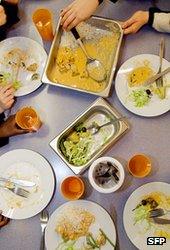
New rules promote variety
The school food plan, external, designed to promote healthy eating, will be mandatory for local authority schools, new free schools and schools that convert to academy status.
Pastry limit
They will replace regulations introduced in the wake of TV chef Jamie Oliver's campaign to improve the standard of school food.
The Department for Education said the previous rules had done "much to improve school food" but "were complicated and expensive to enforce".
The revised regulations are intended to allow school cooks more "flexibility".
The school meal requirements include:
one or more portions of vegetables or salad as an accompaniment every day
at least three different fruits and three different vegetables each week
an emphasis on wholegrain foods in place of refined carbohydrates
an emphasis on making water the drink of choice
limiting fruit juice portions to quarter pints (150ml)
restricting the amount of added sugars or honey in other drinks to 5%
no more than two portions a week of food that has been deep-fried, batter-coated or breadcrumb-coated
no more than two portions of food that include pastry each week
a portion of milk (lower fat and lactose reduced) to be made available once a day.
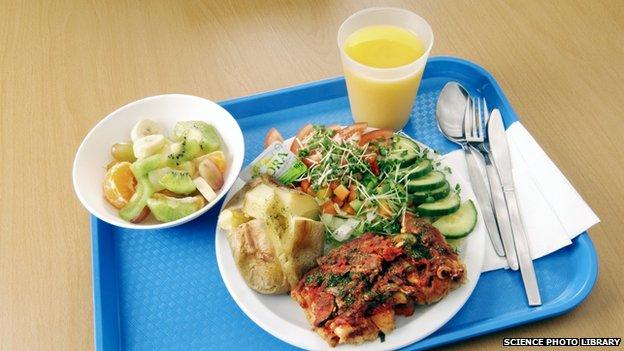
Children are being encouraged to eat more healthily at lunch times
Dietician Ursula Philpot said 57% of pupils currently had packed lunches and that more should be done to increase the number of those eating school food.
She told BBC Breakfast: "We have to rebrand school meals and make them something that children want to do.
"That can only be done by training the chefs, by training the catering staff, by making the school environment - where children eat - better."

two deep-fried food items and three fried starchy items a week
cake and biscuits only at lunchtime
one portion of fruit and one of vegetables a day
one portion of protein from meat. fish, and other non-dairy sources
red meat: twice a week in primary schools, three times a day in secondary schools
processed meat such as burgers, sausage rolls, meat pies once a fortnight
low fat milk and lactose-reduced milk available daily
sugar and honey contents of hot drinks limited to 5%

Restaurateur Henry Dimbleby told the programme the aim was to "protect children from the worst excesses of modern food that's available in society" and encourage them to try healthier foods.
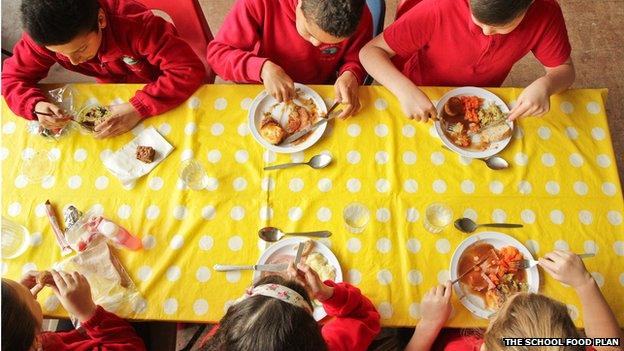
The existing plan includes one portion of protein and one of fruit and vegetables a day
The restaurateur, a member of the expert panel behind the healthy eating plan, said: "The best cooks are not just cooks, they engage, they're out in the school canteen, persuading children who haven't tried things to try them.
"It's about selling, it's about encouraging these children to eat well, setting a standard early in life."
'Clear and concise'
Jamie Oliver welcomed the guidance, saying: "For me, these mandatory minimum standards are so important if we're going to truly protect the next generation."


Rules advise daily protein
Tuesday's menu at Kingsbridge Community College, Devon
tandoori chicken breast with white rice and homemade Indian dips
mushroom risotto with peas
"cheaper" pot meal - chicken tikka
individual pavlovas and chocolate fudge cake
pasta bar with sauces, sicilian, bolognaise and pomodoro
salad bar with homemade quiches
sandwiches, wraps, baps with salad filling included
free fruit given away with each meal - watermelon most popular option

Susan Jebb, professor of diet and population health at Oxford University, said: "We know that children are continuing to eat too much saturated fat, sugar and salt.
"It is vital that the food children are offered in schools is nutritious and helps them to learn about the basics of a healthy diet."
Some parents 'unhappy'
Education Secretary Michael Gove said: "We now have a clear and concise set of food standards, which are easier for cooks to follow and less expensive to enforce. Crucially we have achieved this without any compromise on quality or nutrition."
Deputy Prime Minister Nick Clegg said: "The revised school food standards will allow schools to be more creative in their menus. They are easier for schools to understand and crucially they will continue to restrict unhealthy foods to ensure our children eat well."
Christine Blower, leader of the National Union of Teachers, said it was a "missed opportunity" because it would not be mandatory for all schools.
The regulations will be voluntary for schools that became academies between 2010 and 2014.
"Parents of children in these schools will rightly be unhappy that the government is failing to deliver the same guarantee of minimum nutritional food standards for all schools," she said.
- Published5 May 2014

- Published27 March 2014

- Published6 March 2014
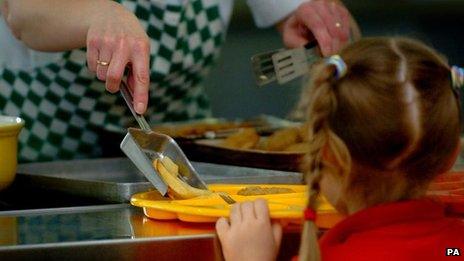
- Published12 July 2013
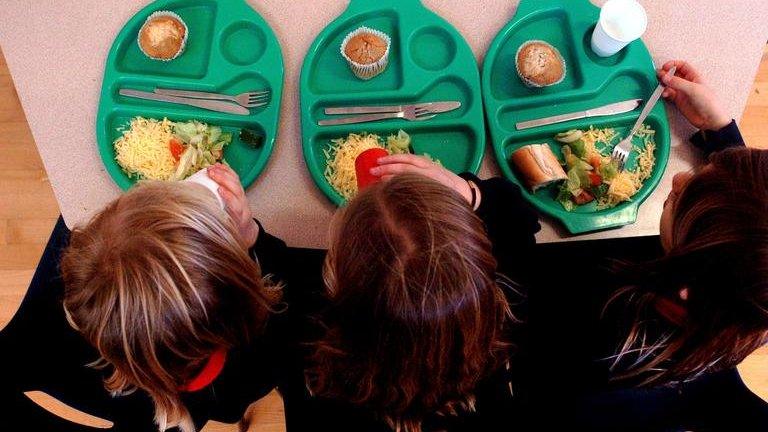
- Published22 April 2012
